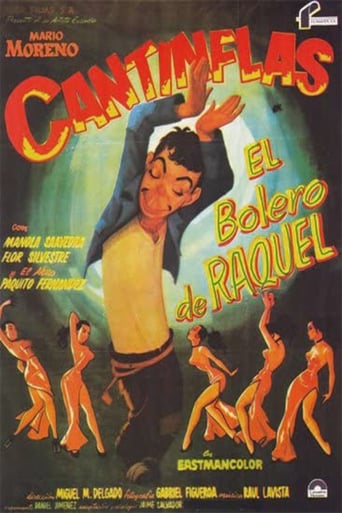MartinHafer
This is only the second Spanish language movie I've seen starring Catinflas (the other was the sweet "The Little Priest")--so I certainly am no expert on his work. I noticed that IMDb mentioned that Chaplin himself thought that Catinflas was a living genius but I would say in some ways he and Chaplin's 'Little Tramp' are very similar yet very, very different. Both are working class heroes--poor but decent shmoes who you can't help but like. Both have a soft spot for kids (and "El Bolero de Raquel" is in many ways like Chaplin's "The Kid"). And, both have a penchant for getting into trouble. But, conversely, while Chaplin was all pantomime, Catinflas (at least in the films I have seen) is all talk--and would be totally lost in a silent film. Catinflas talks, and talks and talks--which might make his films wonderful fun for Spanish-speaking audiences, but they lose a bit in subtitles---especially since he uses a lot of colloquialisms and much of his talk isn't supposed to make that much sense.I think I had a little bit easier time with this particular film than most Americans--as I have a somewhat decent understanding of the language (for an American this means not that great--as we are a country filled with people who should be learning more languages--but don't get me started there!). So, when Catinflas talked and talked, I often could follow his insanely fragmented logic. Reading his rambling in the credit seemed to lose a bit...The film begins with one of Catinflas' friends dying in an accident. Despite this tragedy, he seems to say and do LOTS of tacky things that evening as well as at the funeral. Yet, like Curious George, no one seems to notice and praise him for being a swell guy. Well, while his heart is good down deep, he would have made a horrible grief counselor! Following the funeral, the dead friend's wife asks Catinflas if he could care for her little boy for a while. Catinflas seems more interested in making time with the lovely widow, but agrees to care for the boy. However, she's left no money and Catinflas is very poor and unskilled--and has to spend much of the film scrounging (usually unsuccessfully) for money. Eventually, however, he makes good--at the same time the mother finally returns to claim the boy. He and the boy have been together a long time now and this is a sad moment--and Catinflas actually seemed better to me at this sort of scene than comedy. But, fortunately for him, a very happy ending soon occurs--one that totally defies logic but gives the film a hopeful ending--something NOT usually seen in a Chaplin film (who tended to use much more pathos).
vaneyoko
This is one of Cantinflas' movies with the most heart. Cantinflas' exchange with children reveals as much about his comic genius as it does his underlying humanitarian attributes. It is easy to see with this movie why Cantinflas is considered the quintessential Mexican "tramp"... because in all he does, with all his faults, and despite the joking around, he still has a conscious. This movie will make you bust a gut (like my father usually does when he sees it), as well as leave you all warm and fuzzy inside. If you like this movie as much as I do, you will also enjoy El Bombero Atomico.


